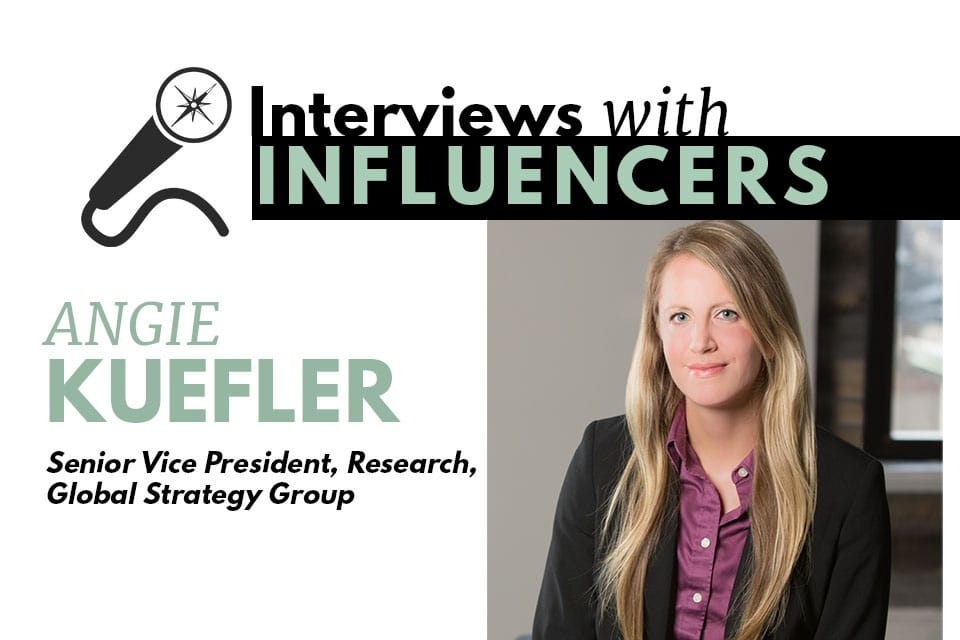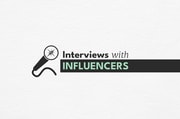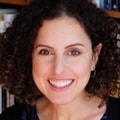Interview Published August 23, 2019 · 8 minute read
Interviews with Influencers: Angela Kuefler
Nicole Siegel

Our team spends a lot of time working to change the conversation in higher education from one focused solely on cost to one that also talks about the importance of quality and value. But you can’t shift a narrative without first understanding the way people feel about our nation’s higher education system. That’s where Angie Kuefler, pollster extraordinaire comes in.
For the last 2.5 years, Angie and her team at Global Strategy Group have been helping us better understand how Americans talk about college quality and value through a comprehensive, multi-phase, public opinion research project. As someone that’s conducted extensive political research in support of Congresswoman Abigail Spanberger and Stacy Abrams, and served as a go-to consultant for Giffords: Courage to Fight Gun Violence, and Everytown for Gun Safety (to name a few), Kuefler’s no stranger to the impact focus groups and online surveys can have on influencing messaging—and ultimately policy.
So for the latest in our Interviews with Influencers series, we were thrilled to sit down with Angie and go behind the proverbial two-way mirror to learn more about her work as a pollster, and specifically, her interest in education.
Q: You’ve focused much of your work on expanding educational opportunity to all students in both K-12 and higher education. And before joining Global Strategy Group, you held a variety of roles at Teach for America (TFA) and Leadership for Educational Equity. What inspired you to work in education, and what keeps you interested in the field?
There's actually a couple different answers to those questions. I got interested initially in education for very personal experiences. I grew up in a smaller town in Minnesota, raised by a single mother, with two brothers. We didn't have a lot of money, and I learned very early on that it wasn't any fun to be poor. I saw education as my way out. My mother never went to college, and my grandparents never went to college, but my mother taught me that education was a way out.
The people I knew in my life who were financially comfortable, and had lives that I really admired, were my aunts who had gone to school, earned a degree, and were able to break out. From a very, very young age, I would clearly articulate to people that I was going to do well in school so I could get into a good college, and get a good job so that I could make a living. As an eight year old I was saying this. That path was always very clear to me.
I graduated high school, got into a good college and did well there. I was like, "Oh great, I did very well in high school, I got into a good school, this works, it's a great system!" In my second year of college I started doing some work study programs where I would work in a magnet school in St. Paul. The students were predominately lower-income, minority students. Three blocks away, I worked at a private Quaker school, all white people, and all people with money. It was the same neighborhood. I saw very clearly, and distinctly, the vast disparities between the two.
In my fourth year of college I saw pamphlets for Teach for America. I saw what education had done for me, and the role it played in distinguishing disparities. I wanted to help. It was really TFA where I started to learn a lot more about education. It’s not just a matter of working hard, or access to resources. I came from a town of all white people, and I had no concept of white privilege until I learned about it. TFA was really the place where I learned about all of the structural challenges in our nation’s education system.
Q: According to your bio, your favorite research questions are not those about what people believe, but why. Tell me more. Why is this?
If we just focus on the what, we can end up getting it very, very wrong. I'll give you an example from the gun space, because when I'm not working on education I'm focusing my research on guns and gun violence prevention. Early on when we were studying people's perceptions on guns and gun laws and what we should do, it became clear with more moderate to right leaning voters that we needed to make clear that we weren't going to take all their guns away, that we just wanted to put some restrictions on who should have them.
We tested various ways to do it, and early on, we said, "Okay, the way to do it is by saying look, I support the Second Amendment, but that doesn't mean there aren't steps we can take," so on and so forth. For a few years, that worked quite well. We started to see some erosion in that though. We started to see when we would test various experiments that when Democrats and Republicans heard that phrase, they would go into their partisan corners and it was no longer having the same effect. We couldn't figure out why that was happening until we did some focus group and qualitative research and dug into that a little bit.
What ended up happening is the jig was up. People knew that coming from politicians now rang very hollow and very partisan, and what they really cared about actually was when you dig into, "Okay, well what does respect to the Second Amendment mean? What does that convey to you? What is having a gun and being the right to have a gun, what does that convey to you?" What people articulated were not necessarily an overall reverence to the Constitution, although that was there. What rang true for most voters was the right to protect themselves and their family. That was just fundamentally what people needed to hear. They needed to be soothed on that fact.
Now, our guidance actually quite recently on it has changed. We’ve learned that talking about the Second Amendment is fine, but if you really want to take to these more moderate right-leaning voters, if you really want to soothe their fears, you've got to acknowledge the shared value of it being for self-protection.
Q: Throughout your public opinion research on education generally, can you kind of pick out one finding that surprised you the most?
Before I was a pollster, I was a bit more optimistic about the world. I have increasingly become more cynical, and that's because I sit behind one-way mirrors in focus group facilities and hear people say horrible things. I see in the data very blatant sexism and racism. The numbers don't lie. People can claim all they want that they don’t have racist or sexist tendencies, but when push comes to shove, the proof is in the pudding. Whenever I do an experiment in a poll where half the sample hears a question that asks “Should we do x, y, and z things in education to help African American and Latino individuals?” it doesn’t perform nearly as well as the question with no mention of a specific population of people.
There's all these things from a data and experimental standpoint, both K-12, higher ed, and all sorts of things that really don't shed the greatest light on America, and that has been hard for me to digest and struggle with constantly.
Q: What do you think is the biggest misconception the American people have about higher education?
Well for one, I think many people believe college is four years, which it's not. I think the challenge whenever we talk about higher education, and the policies to alleviate various challenges, is that everyone has had a different experience with higher education. Even if you didn't have a higher education experience yourself, you still made the decision to go or not go, so you still went through the thought process of making the decision. And when you're talking about what to do from a policy standpoint or even how to talk about higher education, you are fundamentally trying to have a conversation with people who have very different world views.
If you didn't go to school, and you're doing fine, or if you didn't attend any higher ed program and you're doing fine and you're trying to have a conversation about alleviating some type of college debt, you're not really going to hear that or necessarily believe that that's important because you're like, "Well, I didn't go to school. And that was fine." On the other hand, if you attended a four-year school, it was a little romanticized and idealized. It was where we found ourselves, it was all these lovely things, and you are then trying to have a conversation with people who really just needed it to help them get a job, and you need to talk about the value of the degree in a totally different way, and that’s a hard conversation to have.
I think there are so many misconceptions. It just so fundamentally depends on the person. That's part of the challenge of this entire topic is figuring out how to align so many different experiences.

